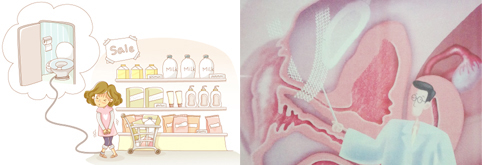
Stress Urinary Incontinence
Stress urinary incontinence is the most common type of urinary incontinence which causes the leak during moments of physical stress such as coughing, sneezing, laughing or exercising. In stress incontinence, weakened sphincter pelvic muscles, which support the bladder and urethra, are unable to prevent urine from flowing when pressure is placed on the abdomen, and surgical treatment is required. Urinary incontinence surgery does not require general or spinal anesthesia. 15~10 minutes of outpatient urinary incontinence surgery only requires approximately 10 minutes of sleep sedation. Patients can return home after a few hours of rest following incontinence surgery, and resume normal daily life on the day of surgery with no down-time. Urinary incontinence surgery has high success rate with low possibility of complication and bladder damage. Although complications after urinary incontinence surgery are rare and mild, patients may experience following symptoms; feeling of residual urine, irritation of vagina lips, urinary tract infections, and vaginal discharge. These complications can be treated with a few days of drug prescription.
* For married women who have delivered a baby, vaginoplasty can be done at the same time of urinary incontinence surgery to rejuvenate loose vagina or pelvic floor muscle.
Overactive Bladder (Urge Incontinence)
Overactive bladder (also known as Urge Incontinence), which can be treated with medication, causes a sudden and unstoppable need to urinate even though the bladder may only contain a small amount of urine. Overactive bladder is caused by sudden inappropriate contraction of detrusor muscle, one of the major bladder muscles. The major symptom of overactive bladder is urinary urgency, a sudden urge to urinate that is difficult to control. Although actual loss of urine is not the defining symptom of overactive bladder, it can happen as a result of urgency. Urinary frequency and nighttime urination or nocturia. For overactive bladder, drug treatment along with vaginoplasty is recommended. Anticholinergics blocks the nerve signals that contracts bladder muscle.
* People with glaucoma, urinary retention, or gastrointestinal disease should avoid using anticholinergic drugs.